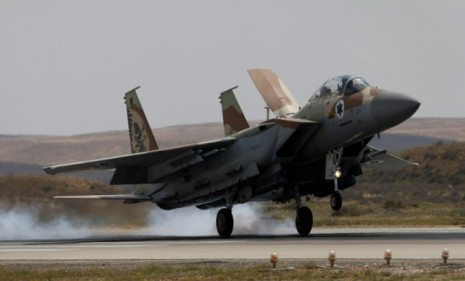America's 'largest-ever' arms deal
The Obama Pentagon has negotiated the biggest-ever U.S. arms deal, with controversial ally Saudi Arabia. Is that a good idea?

A free daily email with the biggest news stories of the day – and the best features from TheWeek.com
You are now subscribed
Your newsletter sign-up was successful
The Obama administration is set to notify Congress of an arms deal with Saudi Arabia worth up to $60 billion, a U.S. record, with another $30 billion in naval defenses under negotiation. The initial agreement involves advanced fighter jets and attack helicopters and is expected to clear the Senate and House without major modifications. But given Saudi Arabia's poor human rights record and ties to 9/11, is America's "largest-ever" arms deal a good idea? (Watch a Fox News report about the deal)
This is about containing Iran: Arms sales to Saudi Arabia used to raise Israel's hackles, says Ian Black in the Guardian, so it's "striking" that the "pro-Israel lobbies" are fine with any deal, much less one this big. That's largely because Israel, and many Arab states, now fear Iran more than the Saudis. The U.S. does, too, which helps explain how "Saudi Arabia and U.S. put 9/11 behind them" so quickly.
"Arms deal: Saudi Arabia and US put 9/11 behind them"
The Week
Escape your echo chamber. Get the facts behind the news, plus analysis from multiple perspectives.

Sign up for The Week's Free Newsletters
From our morning news briefing to a weekly Good News Newsletter, get the best of The Week delivered directly to your inbox.
From our morning news briefing to a weekly Good News Newsletter, get the best of The Week delivered directly to your inbox.
This is a great deal — for terrorists: This deal just makes another 9/11 all the more likely to happen, says Boris Volkhonsky in The Voice of Russia. You'd think the U.S. would have learned from backing al Qaeda against the Soviets that arming your enemy's enemy can be disastrous. And the argument about the arms sale containing Iran is "little more than propaganda" — the Saudis' new weapons will only make Iran work harder to get nukes.
"The U.S. ready to pay $60 bln to create new Osamas"
So much for the arms-sales drought: The Obama team is selling the deal as a U.S. employment bonanza, says Jen Doll in The Village Voice. And I suppose the U.S. could use 75,000 more jobs. But it's a bit of a letdown after just learning that arms sales reached a five-year low in 2005. Employment considerations aside, "we considered a decrease in arms proliferation a bright spot in the recession."
A free daily email with the biggest news stories of the day – and the best features from TheWeek.com